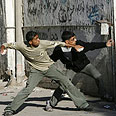
Teens in Jenin (Archive)
צילום: רויטרס
Germany sends extremist rapper to tour West Bank
Palestinian-German rapper Massiv, know for his violent incitement against Israel and the West, invited by Goethe Institute to take part in concerts in territories
BERLIN – "Listen carefully to what the Palestinian is saying: I'm planning a terrible suicide attack. I'll storm you with a 100-day-old beard and we'll blow up like in the Twin Towers."
These words are taken from a song by German-Palestinian rapper Massiv, who recently performed in the West Bank. This incitement might not have been so unusual if it wasn't for one disturbing detail: Massiv's tour in the territories was initiated and funded by the German government and the state-funded Goethe Institute.
Massiv, 26, whose real name is Wassim Taha, was born to Palestinian parents who immigrated to Germany from a refugee camp in Lebanon.
He is considered to be one of the most popular, and certainly most provocative, rappers in Germany. His songs do not only protest against social discrimination, but also openly preach to violence and terror. They also often glorify al-Qaeda and Palestinian, Iraqi and Lebanese "freedom fighters" for "their fight against the Israelis, the Americans and the West."
Massiv often wears a Palestinian keffiyeh (traditional headdress) during his concerts, and on one of his promotional posters he is seen holding up a stone, a clear imitation of the "intifada boys" in the Palestinian territories.
The rapper is also known for his involvement in violent incidents and the German authorities believe him to be associated with Arab crime gangs in Berlin. He is frequently mentioned in the reports of various groups that fight anti-Semitism and racism as a highly influential Muslim extremist.
'We should have been more careful'
Despite of his problematic record, Massiv was recently invited to join the West Bank tour, along with three other Palestinian rappers from Britain and Denmark. The tour was sponsored by the Goethe Institute and the corresponding cultural institutes in Britain, Denmark and France. The four rappers performed in Jenin, Nablus, Ramallah and Bethlehem in front of hundreds of thrilled Palestinian youngsters.The organizers claimed they knew nothing about the controversial content of Massiv's songs. What could have tipped them off was a T-shirt worn by one of Massiv's background singers that bore the title of the rapper's first album, "Blood for Blood."
Throughout the tour Massiv refrained from making extreme statements, but Shadia, a rapper from London who took part in the tour, expressed public support for suicide bombings and called them "the weapon of the oppressed."
Massiv's participation in the tour prompted harsh criticism in Germany from different groups and individuals, including politicians and parliament members who condemned the fact that the Goethe Institute, which should be promoting cultural dialogue and understanding, invited a singer who advocates incitement and hatred.
President of the Goethe Institute, Klaus-Dieter Lehmann, also criticized the decision of the Ramallah branch to invite Massiv. "Some of Massiv's texts are not free of violence. In the future we should be more careful with whom we invite," he stated.










